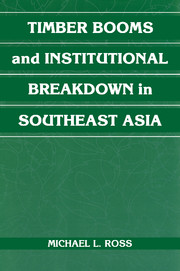Book contents
- Frontmatter
- Contents
- Illustrations
- Tables
- Preface
- 1 Introduction: Three Puzzles
- 2 The Problem of Resource Booms
- 3 Explaining Institutional Breakdown
- 4 The Philippines: The Legal Slaughter of the Forests
- 5 Sabah, Malaysia: A New State of Affairs
- 6 Sarawak, Malaysia: An Almost Uncontrollable Instinct
- 7 Indonesia: Putting the Forests to “Better Use”
- 8 Conclusion: Rent Seeking and Rent Seizing
- Appendix: Chronologies of Events
- References
- Index
2 - The Problem of Resource Booms
Published online by Cambridge University Press: 30 July 2009
- Frontmatter
- Contents
- Illustrations
- Tables
- Preface
- 1 Introduction: Three Puzzles
- 2 The Problem of Resource Booms
- 3 Explaining Institutional Breakdown
- 4 The Philippines: The Legal Slaughter of the Forests
- 5 Sabah, Malaysia: A New State of Affairs
- 6 Sarawak, Malaysia: An Almost Uncontrollable Instinct
- 7 Indonesia: Putting the Forests to “Better Use”
- 8 Conclusion: Rent Seeking and Rent Seizing
- Appendix: Chronologies of Events
- References
- Index
Summary
Before explaining why resource booms lead to the breakdown of institutions, it is important to define my terms and map out the domain of the problem. This chapter describes some basic facts about states that rely heavily on the export of natural resources: it explains what commodity booms are, and how they can create rents; it describes the types of institutions that developing states use to manage their commodity sectors, and to cope with export booms; and it reviews earlier research on the performance of these institutions.
The chapter has three central points: many developing states face periodic booms in their natural resource exports; many of these states have institutions that include features designed to help manage these booms; and despite these institutions, states respond poorly to resource booms.
It may be helpful to mention some of the claims this chapter does not make. It does not claim that all developing states undergo natural resource booms. It does not claim that all booms are followed by institutional collapses. It does not suggest that resource booms are the only source, or even the principal source of failure in these institutions. Finally, it does not try to prove that resource booms cause institutional breakdowns: that is the task of the case studies in Chapters 4 through 7. This chapter lays out the scope of the problem. The rest of the book examines its source.
- Type
- Chapter
- Information
- Publisher: Cambridge University PressPrint publication year: 2001



